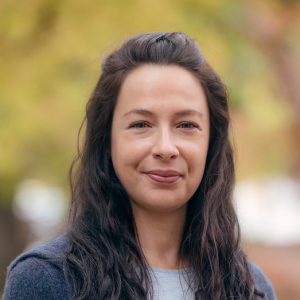Exploring land-based relationships with a fresh view
Understanding the climate and nature emergency from different perspectives is the goal of the Catalyst Collaboration Fund offered by the Peter Wall Institute for Advanced Studies (PWIAS). This year, 10 UBC researchers – including two from Land and Food Systems – received funds of up to $10,000 to support their collaborative projects, knowledge translation and mobilization initiatives related to the climate and nature emergency.
Congrats to all recipients! Here’s a highlight of the Land and Food Systems-led projects, which explore land-based relationships in a unique way.

Tabitha Robin Martens
Indigenous care for the land
Assistant Professor Tabitha Robin Martens received funds for her project titled Caring for the Land: Indigenous Defenders, Guardians, Seed Keepers and Love.
She will be working with Stephanie Lin, an ISLFS (Integrated Studies in Land and Food Systems) master’s student, to explore how Indigenous guardians, watchmen, protectors, and seed keepers express their love and care for the lands of British Columbia. A storytelling methodology will highlight the experiences and motivations of these caretakers, especially in the face of climate change, resource extraction and racism. Challenging common narratives of damage-centered research, Robin’s work foregrounds the importance of community-based actions of love and care for the land, rather than focussing only on the impacts of climate change on the land and communities.
“There are few Indigenous conceptions of care and love for the land, in the literature,” says Robin. “I am a seed keeper and run a seed library in Treaty One/homeland of the Manitoba Metis Nation, which has given me insight into grassroots approaches of caring for the land. I hope this leads to a larger project across Turtle Island and we can better understand Indigenous Nations’ conceptions of care and articulate the importance of people who care for the land. These are invaluable roles within Indigenous food systems.”
Robin plans to use an Indigenous research paradigm in this project. Her work is rooted in the richness and complexities of Indigenous food practices, as she seeks to rebuild traditional food systems.
Trail use impacts on grizzly bears

Sumeet Gulati
Professor Sumeet Gulati’s funded project is Causal Impacts of Human-Trail Use on Spatio-Temporal Patterns of Grizzly Bear Detections in the South Chilcotin Mountains Provincial Park, B.C.
Through the Catalyst Collaboration Fund, Gulati will create a new research partnership with BC Parks and the World Wildlife Fund (WWF) to study how human activity may impact the movement patterns of grizzly bears.

James Vercammen
Gulati, who researches environmental and resource economics, will work on this project with UBC Professor James Vercammen and PhD student Maithili Devadas. Gulati’s current research is on the economics of wildlife conservation, with a focus on human-wildlife conflict.
“We are interested in how recreational tourism in BC impacts wildlife,” says Gulati. “Further, our lab is working on the economics of human-wildlife conflict in India, and this seemed like an obvious application of our expertise to an issue close to all of us in British Columbia.”
Interested in Food and Resource Economics (FRE) research? Check out the website here!
Tagged with: Equity Diversity Inclusion and Indigeneity, Faculty, Food and Resource Economics, Graduate, Indigenous, Integrated Studies